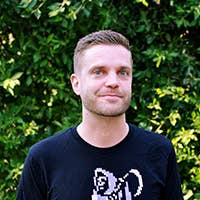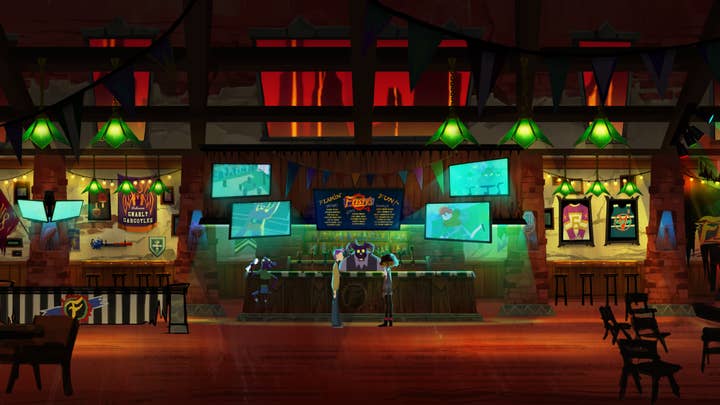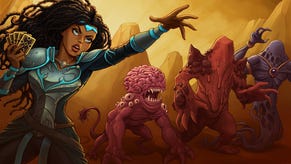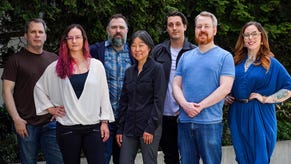From "schokly" licensed games to a critically acclaimed indie
Oxenfree co-director Sean Krankel on the collapse of shovelware and how it helped shape Night School Studio
The advent of mobile has seen almost a complete collapse of the licensed games market on console and PC. There are a few exceptions of course, like 2018's Spider-Man from Insomniac, or Rocksteady's Batman: Arkham series, but the industry has moved past games like 50 Cent: Blood on the Sand, and Desperate Housewives: The Game.
These games are usually recognised as cynical cash grabs rather than a valuable contribution to games an artistic medium. As an industry, we tend to focus the bad marketing decisions, the unrealistic production schedules, or whatever combination of disasters led to Aliens: Colonial Marines.
We almost universally forget about the people actually tasked with bringing Shrek: Super Party to life, for example. That these are creative people and talented problem solvers funnelled into factories, churning out one unfortunate mess after another. Up until quite recently, studios and licence holders were frequently trying to bring franchises like Ghostbusters, Iron Man, and Transformers to console markets, but were hamstrung by the difficult realities of big-budget development.
"What was happening in the games industry at that moment, around the early to mid 2000s, mobile had not taken off yet, social was still in its infancy," says Sean Krankel, co-founder of indie outfit Night School Studio and veteran developer of licensed games.

"At that time you were either working on the biggest, best possible games at places like Bungie -- which I was not -- or you were working on these licensed, schlocky titles. I think what a lot of people outside of the industry, the people working on any of those games especially during that era, it's more a result of the economics and the reality of the publishing industry at that time, than about what a lot of those people wanted to work on.
"The amount of work that goes into a pretty bad licensed game is still a hell of a lot of work, and there's a lot of talented people. The things that really end up hurting titles like that is a truncated timeline, or a difficult license, or just bad decisions or planning made early on."
Krankel's career in modern media stretches back to working on a "pretty bad" soap opera called Sunset Beach in the mid-90s. Now, after having his very own PlayStation 1 era platformer cancelled by Universal at the age of 21, working at Disney on three separate occasions, and a stint in advertising, is preparing to launch Afterparty.
A narrative-driven adventure game about two recently deceased millennials challenging Satan to a drinking contest in the bowels of hell, Afterparty comes nearly three years after the studio's debut hit, Oxenfree.
Krankel founded the studio with his cousin Adam Hines, a former Telltale developer who worked on The Wolf Among Us and Tales From the Borderlands. The trials and tribulations of bouncing around the world of licensed games for so many years were formative to Krankel's decision to ultimately go indie, but so was the changing face licensed game development, where his career had lived off and on for over half a decade.
After first joining Disney Animations as a production coordinator on Toy Story 2 and A Bug's Life, Krankel moved over to Universal during the heydey of mascot platformers. Without any game development experience or qualifications, he was given directorship over his own IP for Microsoft, working with a British dev team.

"At that time, there wasn't really a clear path [into game development]," he tells GamesIndustry.biz. "There wasn't a lot of curriculum in colleges as there is today and everyone was getting into games through just totally random avenues... I was 'leading' this team, I had no idea what I was doing.
"It was this thrilling year and a half of thinking, 'We're going to build the next big IP and I'm just a kid being allowed this opportunity.' Then a lot of the other platforming games other publishers were putting out started to bomb horribly. So Universal as a publisher started getting pretty nervous about that type of investment, and as quickly as my game had gone up, it disappeared."
But this time serving in the mines of doomed platformers and licensed games informed Krankel how to run an indie studio, in that they helped shape a perspective on how not to do things -- by keeping the number of people involved in a project low, and getting out from beneath the heel of licence holders and clueless marketing departments.
"The amount of work that goes into a pretty bad licensed game is still a hell of a lot of work, and there's a lot of talented people"
"It's amazing, not having to deal with that any more," he says. "The thing is, sometimes because it's a licensed game -- but often times it's just because you're in a large company -- the amount of hurdles and meetings and people justifying certain viewpoints and 15 ideas in one room bouncing off each other, and you walk out of a two-hour meeting and nothing happens, that all just disappears in this environment we are in."
The environment of licensed game development was something Krankel says he struggled to make a creative impact in, but that smaller studios grant autonomy, remove barriers to progress, and encourage a quick decision-making.
"As somebody who had spent most of my career in big companies, that is the environment I want to create and nurture for the team [at Night School Studio]," Krankel continues. "One where all the team members are thinking every day as they enter the building, how do they make the coolest shit possible? That's all I want them to think about.
"And part of that comes from this autonomy of not having a license attached, but I think the million paper cuts you feel in a big company come more from second guessing yourself all the time, and running decisions through 50 different filters, and not pushing the project forward because you have a wait a week and a half to to get on somebody's schedule to talk to them. Whereas now, we do not have the ability or luxury to wait on any decision. We just have to make decisions because if games don't come out, this studio doesn't exist."
Transitioning into indie development "felt like a lot of weights coming off our shoulders" says Krankel. There is a frustration that comes with developing licensed games, not necessarily because the property-holder or development team don't care, but because everyone in between doesn't.
"The thing is, the people who make those licenses, if it's a TV showrunner or a movie team, they want cool stuff too," continues Krankel. "They really want those games to be awesome. So it's not even the fault of any of them. It's all the people in between that make it difficult to make the game... So much of why licensed games are bad, other than the timelines, is because you have these worlds that are built to be TV shows or a movie, and you're like, 'Now I have to have a jetpack in this thing' or whatever it may be. And for us, we really want our stories to come from mechanic decisions because we're game company at our core."








